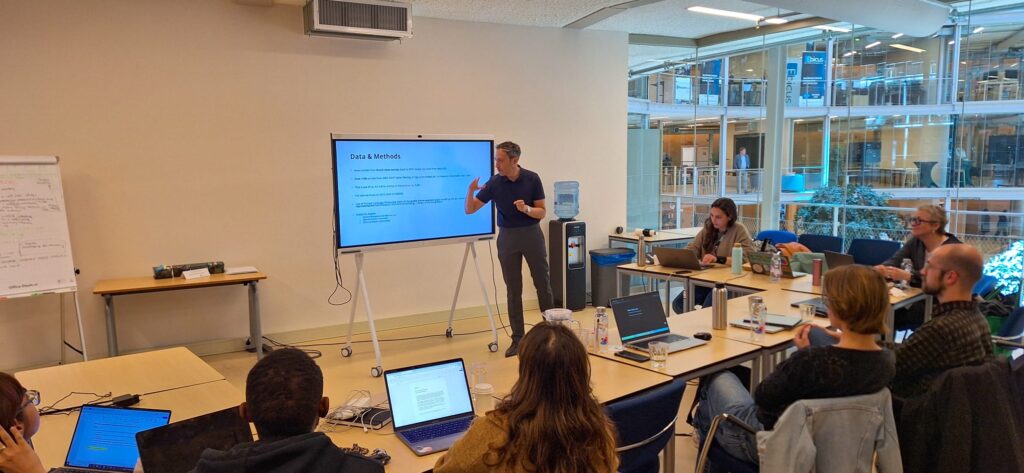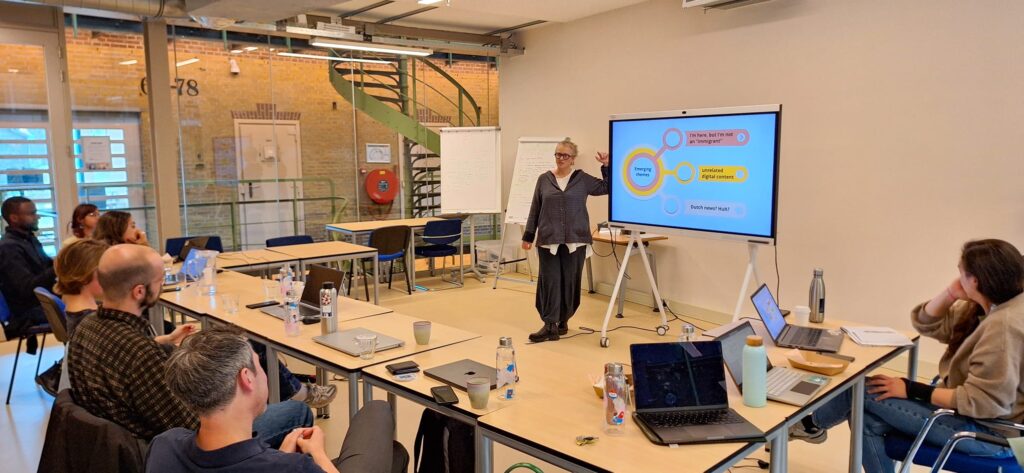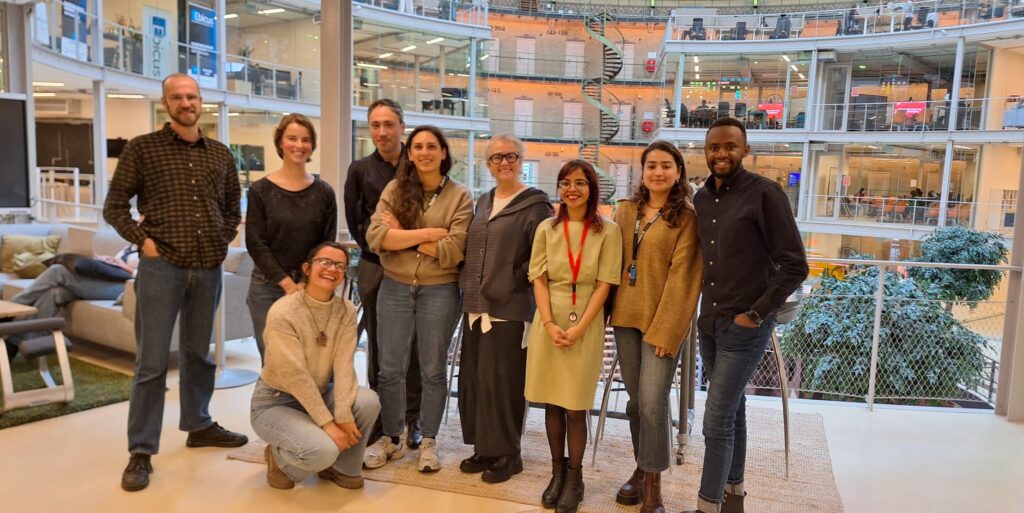Counternarratives About Migration Among Young Adult Content Creators
Impact Project Collaboration Between RNW Media, Prof. Annette Markham, and Data School
On May 27, 2025, within the walls of a former Panopticon-style prison that now houses RNW Media’s office in Haarlem, we convened for our first collective reflection on emerging findings from one of our impact projects. This transdisciplinary initiative brings together expertise from RNW Media, Prof. Annette Markham, and Utrecht Data School to collaboratively investigate how migration is narratively constructed in Dutch media while simultaneously bringing to the forefront the counternarratives that young adult content creators develop to amplify migrant voices.
Counteracting Symbolic Bordering Through Digital Media Platforms
Symbolic bordering operates much like symbolic silencing, fundamentally constraining migrant agencies by excluding certain voices or rendering them passive in media representations. Rather than being portrayed as subjects with their own stories, migrants are depicted as objects – statistics rather than individuals with complex lived realities.
Lilie Chouliaraki (2017, 78-79) conceptualized this phenomenon as the intersection of “geo-political bordering of migrants” with “symbolic bordering” practices that “appropriate, marginalize or displace their digital testimonies in Western news media.” This symbolic bordering is most evident when migrant experiences, pathways, and journeys are conveyed through quantitative data rather than through personal narratives and individual stories.
The impact of this appropriation, marginalization, and displacement extends far beyond representational concerns, as asylum seekers and refugees report experiencing greater anxiety, self-censorship, and diminished desire to integrate into their new communities. This highlights the crucial need to examine how Dutch media constructs the discourse surrounding migration and how migrants themselves reclaim digital spaces to challenge symbolic bordering and articulate their own narratives.
This project, therefore, centers on young adults who have recently arrived in the Netherlands and actively create digital content. We collaborate with them to understand how they navigate digital media affordances, encompassing vernacular expression, platform design, and algorithmic reach, to negotiate identity and belonging within online spaces often dominated by anti-immigrant sentiments and narratives.
Pillar 1: Analyzing Mainstream Media Coverage
However, in order to effectively bring counternarratives to the forefront, it is imperative to first attend to the hegemonic discourses these counternarratives seek to subvert. This requires a systematic investigation of mainstream media coverage, analyzing how migrants and their journeys, pathways, stories, and experiences are constructed through prevailing topics, frames, and emotional registers. This project’s first pillar addresses this foundational analysis.
During the meeting, the Utrecht Data School team, comprised of Dr. Dennis Nguyen, Jeroen Bakker, Melvin Hoogendijk, and Zahran Kamal, presented initial findings from their NLP-driven media frame analysis and representation research. Their investigation examines migration discourse across Dutch news outlets, revealing insights about dominant representational patterns in public narratives and identifying recurring frameworks, themes, and affective dimensions. Thus far, their analysis established “Migration and Integration” and “Politics and Law” as the most prominent meta-topics.

Pillar 2: Participatory Engagement and Lived Experiences
While the first pillar maps mainstream media coverage, the second pillar examines experiential dimensions, including how migrants feel and perceive their environment, and what emotions, concerns, and reflections lie at the heart of their experiences. This approach allows migrants to speak in their own voices, revealing the complexity of their lives that defies statistical reduction and cannot be captured (solely) through quantitative means.
The central question driving this pillar asks: “How do immigrant digital content creators in the Netherlands navigate digital media affordances to negotiate identity and belonging within online environments shaped by anti-immigrant sentiment and narratives?” This question is explored through an ethnographically grounded, qualitative investigation that examines how migrants sense and make sense of their environments, paying attention to how they feel, move through, and engage with digital media as both audience and participant.
During our meeting, Prof. Annette Markham presented research findings that combined literature analysis with semi-structured interviews, conducted collaboratively with the RNW Media team and research assistants Mieke Postma and Jenny Chan. This overarching inquiry encompasses several focused research areas:
- What patterns have emerged in the past decade in the Dutch media landscape, contributing to narrative frameworks about what it means to be a ‘good’ versus ‘bad’ migrant?
- How might algorithmic processes constrain or enable the flow of these narrative frames?
- How might sharing practices among migrant content creators reinforce or resist these narrative frames?

Reflections on the Meeting
This meeting of the minds allowed us to share critical insights on how Dutch media constructs migrant narratives and how migrants reclaim agency through digital platforms, facilitating mutual learning throughout our collaboration. We engaged in collective exploration of key questions, critical reflections, and potential avenues for further inquiry, including assessing the alignment of the two research pillars with RNW Media’s overarching vision; identifying specific Dutch media framings of interest to the RNW Media team to guide further investigation by Data School; evaluating whether self-censorship emerged as prominently in the analysis of mainstream media coverage as it did in the conducted interviews; and considering the potential value of exploring independent and public-interest media organizations that actively challenge dominant narratives, in order to understand their strategies for countering the status quo.
Still, the value of this collaboration extends beyond the moments when we come together to exchange ideas, brainstorm, and learn from and with one another; it resides in the ongoing process of working collaboratively across diverse forms of knowledge, disciplines, and expertise. As Zahran Kamal shared with me:
“What felt really productive about this collaboration was experiencing a small ‘eureka’ moment when I could apply skills from my primary field in STEM to offer a new perspective on the RNW project. It was quite curious how this playful experimentation ultimately proved helpful to the researchers. I also appreciate the team’s strong focus on making our work comprehensible and accessible to external partners. In this case, I was trying to understand and learn how journalists might further engage with the topic.”
Current Positioning & Paths Forward
The challenge: Migrant perspectives remain peripheral in European media or are selectively amplified when they serve particular narratives.
What happens: This creates symbolic bordering that defines limits of agency and generates exclusion, compounded by geopolitical bordering that creates physical barriers between countries and communities.
What we need: Counternarratives that emerge from lived experiences, amplify voices challenging mainstream media representation, and allow migrants to regain agency over their stories.
Where to find this: In counter-publics, digital and otherwise, where migrants can exercise storytelling agency without restrictions.
How to facilitate this: Through collaborative co-creation with migrant digital content creators – conducting research not only about migrants but with them, amplifying marginalized voices, building themes, and co-creating toolkits and best practices together.
This collaborative approach marks the trajectory we are pursuing together! Stay tuned for updates on future meetings and how the project progresses!

References
Chouliaraki, Lilie. 2017. “Symbolic Bordering: The Self-Representation of Migrants and Refugees in Digital News.” Popular Communication 15 (2): 78-94.
https://doi.org/10.1080/15405702.2017.1281415.
